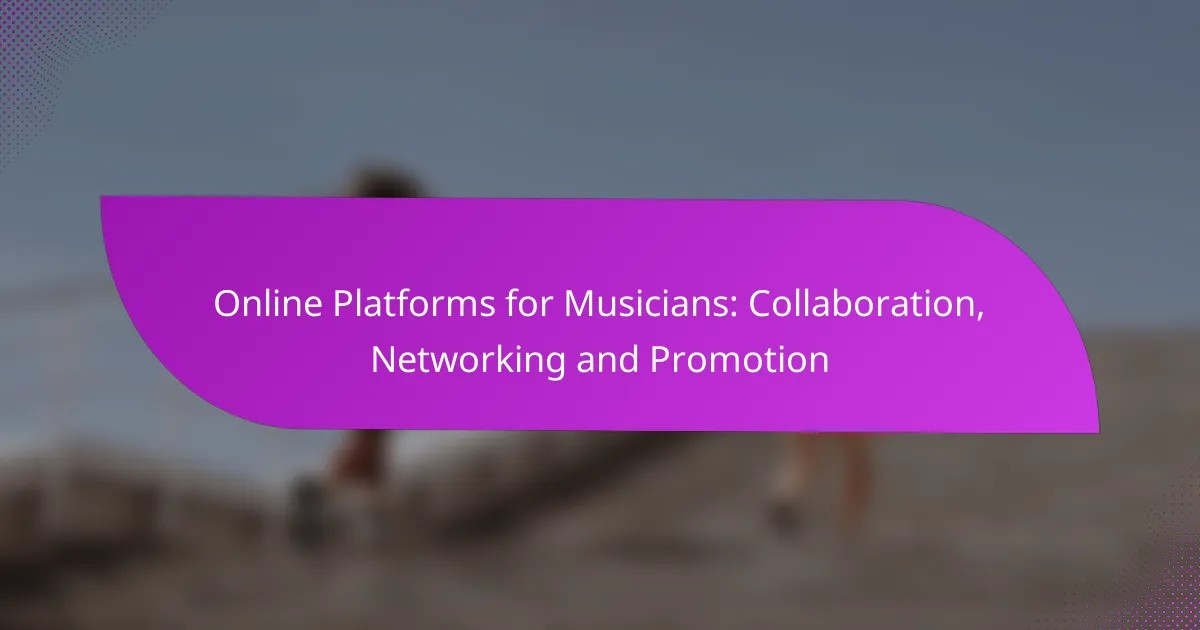Online platforms for musicians provide essential tools for collaboration, networking, and promotion, each designed to meet specific needs in the music industry. By utilizing these digital resources, artists can connect with peers, share their work, and engage with fans, all while breaking down geographical barriers. These platforms not only enhance creativity but also foster valuable connections that can significantly impact a musician’s career.
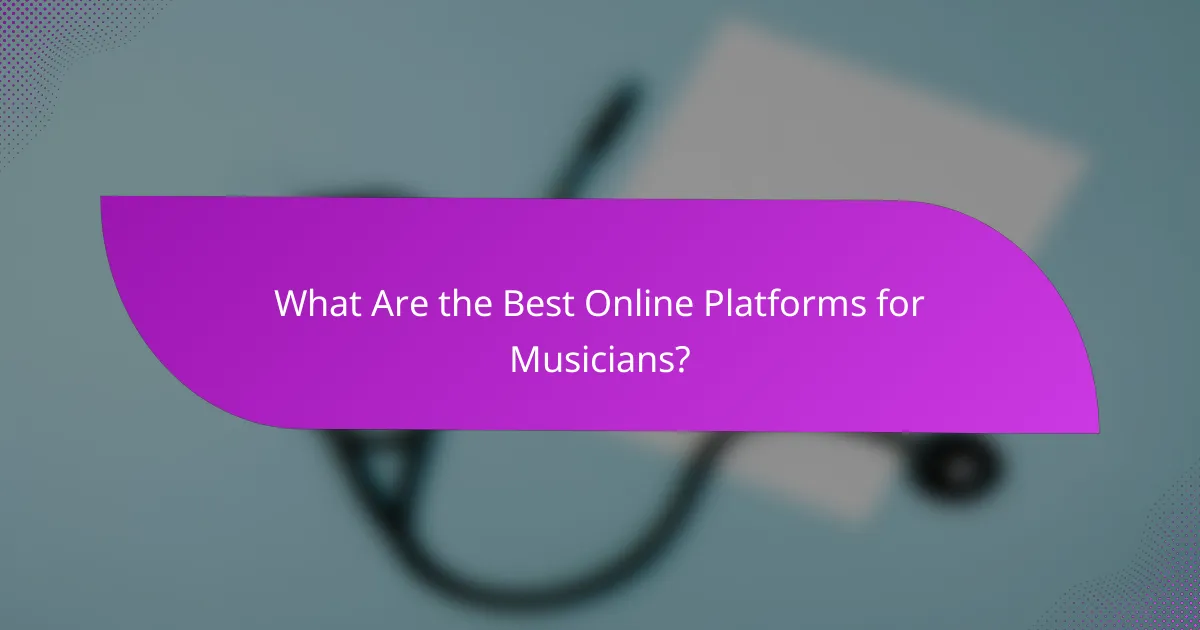
What Are the Best Online Platforms for Musicians?
The best online platforms for musicians offer tools for collaboration, networking, and promotion. Each platform has unique features that cater to different needs, from sharing music to engaging with fans and industry professionals.
SoundCloud
SoundCloud is a popular platform for musicians to upload, share, and promote their music. It allows users to connect with listeners and other artists, making it ideal for collaboration and feedback. Artists can upload tracks for free, but a Pro account offers advanced features like detailed analytics and increased upload time.
To maximize your presence on SoundCloud, engage with your audience by responding to comments and sharing your music on social media. Consider using tags effectively to reach a broader audience.
Bandcamp
Bandcamp is a platform that enables musicians to sell their music directly to fans, offering a fair revenue share. Artists can set their own prices, including the option for fans to pay more if they wish. This model supports independent musicians and allows for a more personal connection with listeners.
Utilize Bandcamp’s features such as merchandise sales and digital downloads to enhance your offerings. Regularly update your page with new releases and exclusive content to keep fans engaged.
ReverbNation
ReverbNation provides tools for musicians to manage their careers, including music distribution, promotion, and fan engagement. It offers a range of services from digital distribution to opportunities for live performances. The platform is particularly useful for emerging artists looking to build a fanbase.
Take advantage of ReverbNation’s promotional tools, such as email campaigns and social media integration. Regularly update your profile and engage with the community to increase visibility.
Spotify for Artists
Spotify for Artists allows musicians to manage their profiles and access valuable analytics about their listeners. This platform is essential for promoting music and reaching a global audience. Artists can submit their songs for playlist consideration, which can significantly boost streams and visibility.
To optimize your Spotify presence, keep your profile updated with engaging visuals and accurate information. Use the analytics to understand your audience and tailor your marketing strategies accordingly.
Facebook Music
Facebook Music integrates music sharing and promotion within the social media platform, allowing artists to connect with fans directly. Musicians can create dedicated pages, share updates, and engage with their audience through posts and live streams. This platform is particularly effective for building a community around your music.
Utilize Facebook’s advertising tools to reach targeted audiences and promote events. Regularly interact with fans through comments and messages to foster a loyal following.
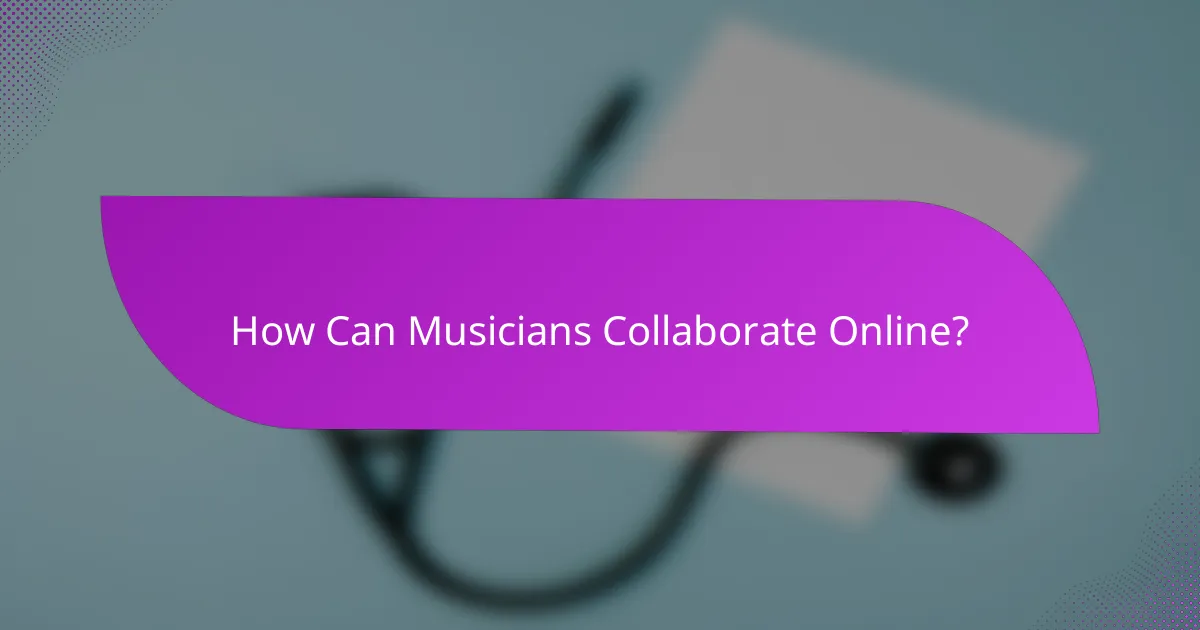
How Can Musicians Collaborate Online?
Musicians can collaborate online through various digital platforms that facilitate communication, sharing of ideas, and joint projects. These tools enable artists to work together regardless of geographical barriers, enhancing creativity and expanding their networks.
Collaboration Tools
Collaboration tools are essential for musicians looking to create music together remotely. Platforms like Soundtrap and BandLab allow users to record, edit, and share tracks in real-time. These tools often include features such as chat functions and video calls, making it easier to communicate and brainstorm ideas.
When selecting a collaboration tool, consider factors like ease of use, available features, and whether it supports the audio formats you typically work with. Free versions can be a good starting point, but premium features may enhance your experience.
Project Management Platforms
Project management platforms help musicians organize their collaborative efforts efficiently. Tools like Trello and Asana can be used to track tasks, deadlines, and project milestones. This ensures that all collaborators are on the same page and can manage their contributions effectively.
To maximize productivity, set clear goals and assign specific tasks to each member. Regular check-ins can help maintain momentum and address any challenges that arise during the collaboration process.
Virtual Jam Sessions
Virtual jam sessions allow musicians to play together in real-time over the internet. Platforms like JamKazam and Ninjam provide a space for artists to connect and perform, simulating the experience of jamming in person. These sessions can be a fun way to experiment with new sounds and styles.
For successful virtual jam sessions, ensure you have a stable internet connection and consider using headphones to minimize audio feedback. Scheduling regular sessions can also help build rapport among collaborators and enhance musical synergy.
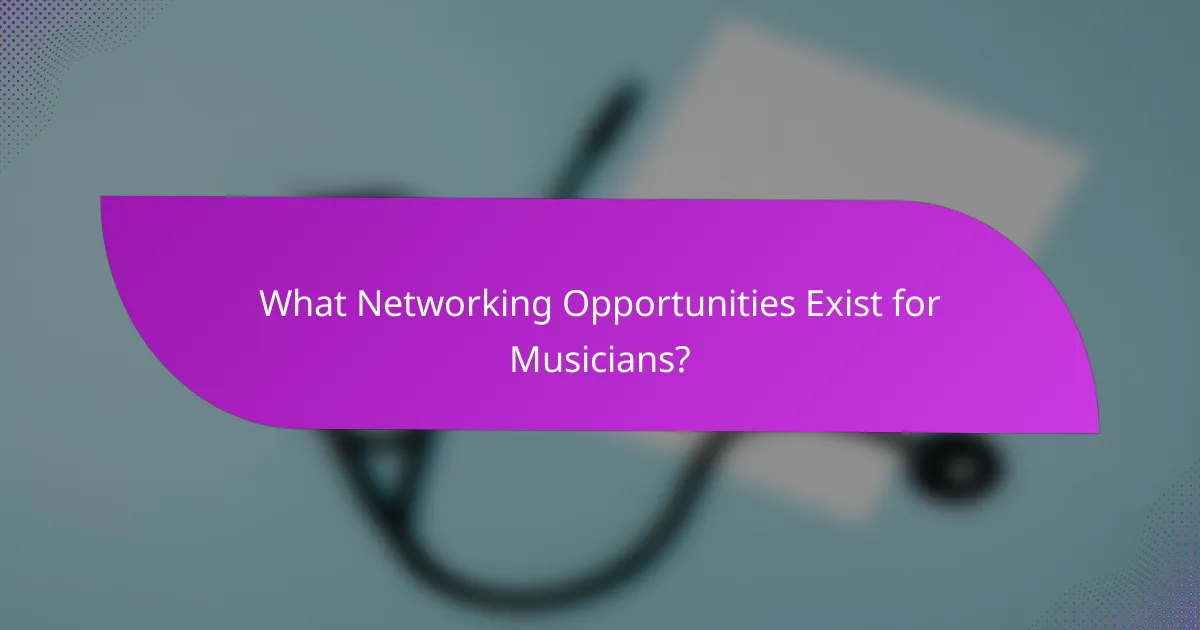
What Networking Opportunities Exist for Musicians?
Musicians can leverage various networking opportunities to enhance their careers, including online communities, social media platforms, and industry events. These avenues facilitate collaboration, promote visibility, and help build valuable connections within the music industry.
Online Music Communities
Online music communities are platforms where musicians can connect, share their work, and collaborate. Websites like SoundCloud, BandLab, and ReverbNation allow artists to showcase their music, receive feedback, and engage with other musicians globally.
Joining these communities can provide access to resources such as tutorials, collaboration opportunities, and industry insights. Participating actively in discussions and sharing your music can significantly increase your visibility and help you build a supportive network.
Social Media Networking
Social media platforms like Instagram, Facebook, and TikTok are essential for musicians to network and promote their work. These platforms enable artists to share their music, engage with fans, and connect with other musicians and industry professionals.
To maximize your networking efforts, consistently post engaging content, use relevant hashtags, and interact with your audience. Collaborating with influencers or other musicians on these platforms can also expand your reach and enhance your credibility.
Music Industry Events
Music industry events, such as conferences, festivals, and workshops, offer excellent networking opportunities for musicians. Attending events like South by Southwest (SXSW) or local music festivals allows artists to meet industry professionals, potential collaborators, and fans face-to-face.
When attending these events, prepare a professional pitch and bring business cards. Engaging in conversations and following up with new contacts afterward can lead to fruitful collaborations and career advancements.
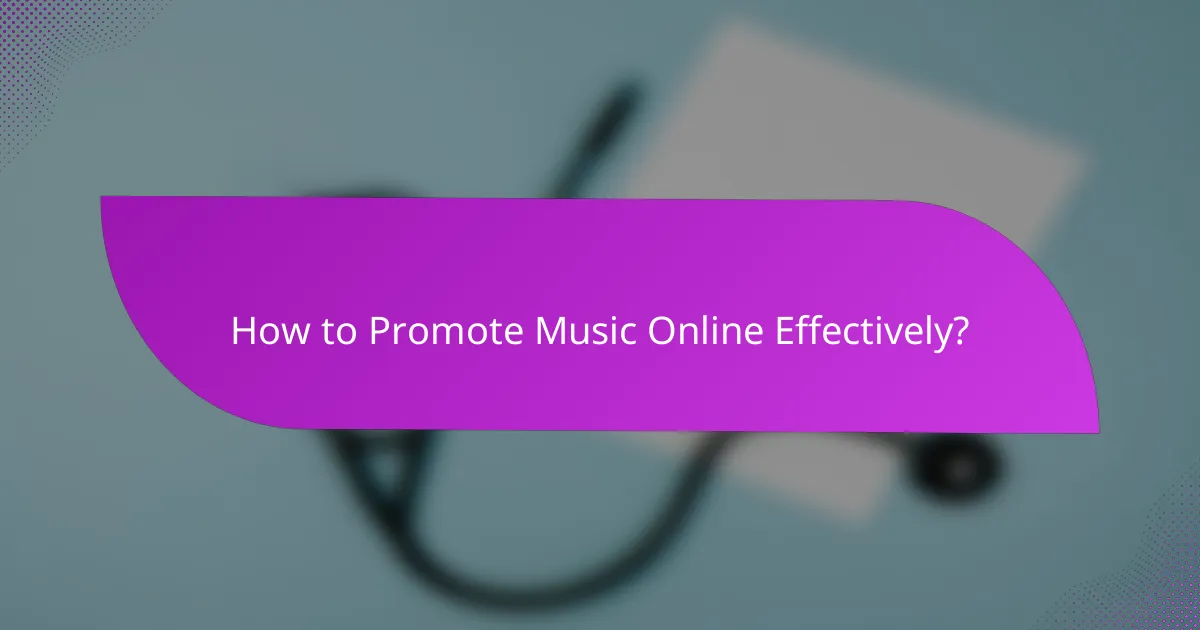
How to Promote Music Online Effectively?
To promote music online effectively, focus on building a strong presence across various digital platforms while engaging with your audience. Utilize social media, email campaigns, and influencer collaborations to reach a wider audience and foster connections.
Social Media Marketing
Social media marketing is essential for musicians to connect with fans and promote their music. Platforms like Instagram, Facebook, and TikTok allow artists to share content, engage with followers, and showcase their personality.
To maximize impact, create a content calendar that includes regular posts, stories, and live sessions. Use hashtags relevant to your genre and engage with followers through comments and direct messages. Aim for consistency in posting to keep your audience engaged.
Email Campaigns
Email campaigns are a direct way to reach your fans with updates, exclusive content, and promotions. Building an email list can be done through sign-up forms on your website or social media platforms.
Craft engaging newsletters that include information about new releases, upcoming shows, and special offers. Keep your emails concise and visually appealing, and consider segmenting your list to tailor content to different audience groups. Aim for a frequency of one to four emails per month to maintain interest without overwhelming subscribers.
Influencer Collaborations
Collaborating with influencers can significantly boost your music’s visibility. Influencers can introduce your work to their established audiences, providing a valuable promotional avenue.
Choose influencers whose style aligns with your music and who have an engaged following. Reach out with a clear proposal on how you can work together, whether through sponsored posts, music reviews, or social media takeovers. Track the results of these collaborations to assess their effectiveness and refine your approach for future partnerships.
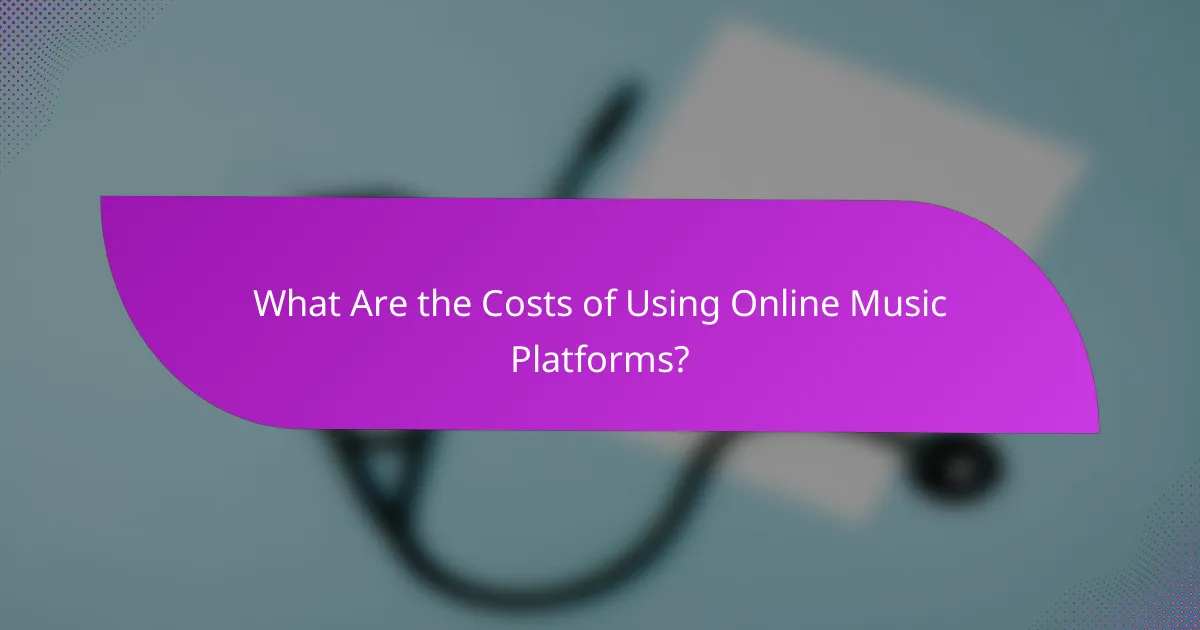
What Are the Costs of Using Online Music Platforms?
The costs of using online music platforms can vary widely depending on the services offered. Musicians should consider subscription fees, commission rates, and advertising costs when evaluating these platforms.
Subscription Fees
Subscription fees are monthly or annual charges that musicians pay to access premium features on music platforms. These fees can range from around $5 to $30 per month, depending on the platform and the level of service provided.
Some platforms offer free tiers with limited features, while others may provide a trial period. It’s essential to assess whether the additional features justify the cost based on your specific needs as a musician.
Commission Rates
Commission rates refer to the percentage of revenue that platforms take from sales or streams. Typically, these rates can range from 10% to 30%, depending on the platform and the type of service.
For instance, streaming services often take a higher commission compared to platforms that facilitate direct sales. Understanding these rates is crucial, as they directly impact your earnings from music sales and streaming.
Advertising Costs
Advertising costs on online music platforms can vary significantly based on the type of promotion you choose. Pay-per-click ads or sponsored posts may cost anywhere from a few dollars to hundreds, depending on the reach and duration of the campaign.
When budgeting for advertising, consider setting a clear goal for your promotion and monitoring the return on investment. Avoid overspending by starting with a small budget and adjusting based on the performance of your ads.
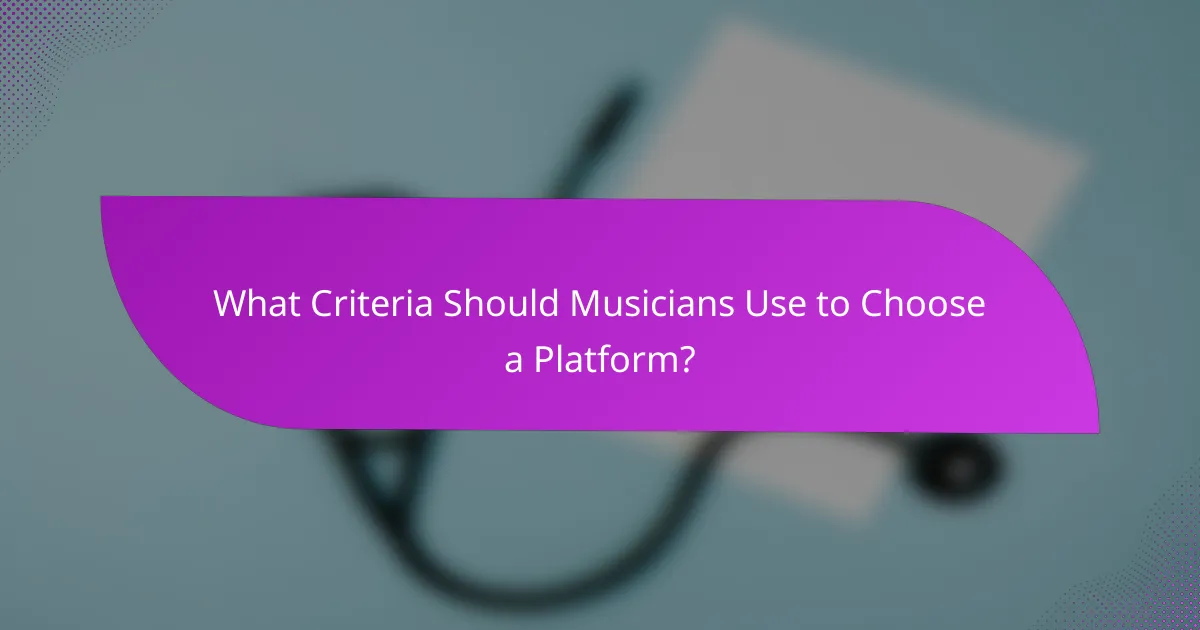
What Criteria Should Musicians Use to Choose a Platform?
Musicians should consider several key criteria when selecting an online platform for collaboration, networking, and promotion. These include the platform’s target audience, features, ease of use, and potential for exposure.
Target Audience
Understanding the target audience of a platform is crucial for musicians. A platform that caters to a specific genre or demographic can provide more effective networking and collaboration opportunities.
For instance, platforms like SoundCloud are popular among independent artists and electronic music creators, while Bandcamp is favored by those selling music directly to fans. Choosing a platform aligned with your audience can enhance engagement and support your promotional efforts.
Before committing, research the user base of potential platforms. Look for communities that resonate with your music style and check for active participation, as this can significantly impact your reach and networking potential.
